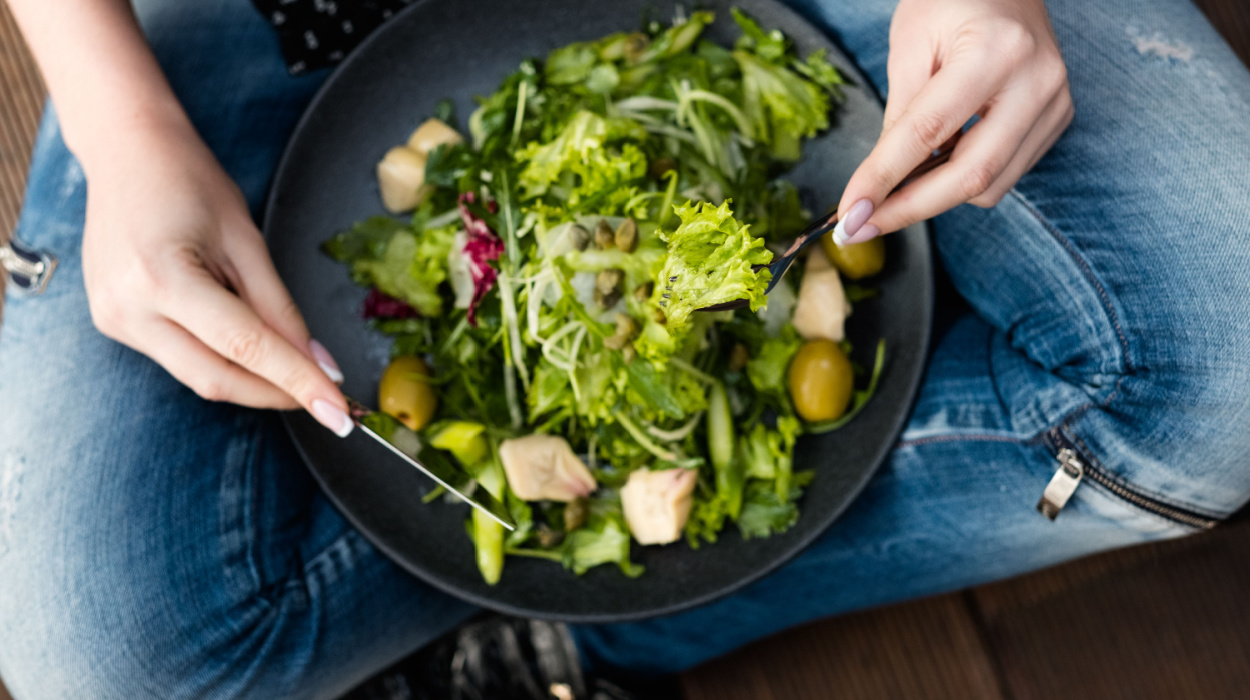Are you on the journey to a trimmer waistline? Do you want to learn how to lose belly fat in a week without exercise? This article gives you the best tips to lose weight quickly and effectively.
We’ll navigate through practical techniques and essential precautions to sculpt your midsection. Learn how to use nutrition and stress reduction methods for visible and sustainable results, from getting good sleep to the right amount of fiber per day to ignite weight loss.
Let’s explore the key to belly fat reduction without the need for strenuous workouts.
How To Lose Belly Fat Without Exercise In A Week
Here are some of the best strategies for quick belly fat loss:
- Limit alcohol.
- Avoid processed foods.
- Work on your posture.
- Eat smaller, frequent meals.
- Eat more fiber.
- Eat a healthy diet.
- Stay hydrated.
- Get sufficient sleep.
- Manage stress.
- Take supplements.
- Take a shot of apple cider vinegar daily.
How To Lose Belly Fat In A Week Without Exercise
Visceral fat is found deep within the abdomen surrounding vital organs, posing potential health risks. To avoid such health risks, you must make mindful dietary and lifestyle choices. There are a range of simple yet impactful changes that can pave the way for a trimmer waistline without the need for a single workout.
Here are the methods that can help you get rid of belly fat in a week without exercise:
Limit Alcohol
Limiting alcohol intake plays a pivotal role in weight loss without exercise. Research continues to show[1] that alcohol intake can be a risk factor for obesity for some individuals.
Alcohol hinders the liver’s fat metabolism,[2] increasing tummy fat. Regular alcohol consumption also disrupts the gut bacteria balance,[3] affecting the metabolism and increasing belly fat. Additionally, alcohol causes dehydration because it reduces your body’s water retention capacity.
Overindulgence can often result in a calorie surplus because most alcoholic beverages have a high-calorie count.[4] Many cocktails and flavored drinks also have added sugars that can contribute to your overall calorie intake. Therefore, it’s best to limit alcohol to create a calorie deficit that helps you lose weight and reduce the negative impact[5] it has on your body.
Avoid Processed Foods
Avoiding processed foods[6] is crucial for managing unwanted belly fat. These items often contain[7] unhealthy fats, sugars, sodium, and additives that cause gut imbalances and inflammation[8] associated with abdominal weight gain. Moreover, they lack essential nutrients, which can cause overeating as more is needed to feel full.
Processed foods can also spike blood sugar levels and promote fat storage. Opt for a diet rich in whole, unprocessed foods like lean proteins, fruits, and vegetables. These nutrient-dense choices support weight loss by providing the essential vitamins you need to lose weight.
Work On Your Posture

Achieving a flat belly involves more than just maintaining good posture. While improving your posture certainly enhances your appearance, it won’t directly shed belly fat. However, it redistributes your weight evenly to minimize the prominence of stomach bulges.
Straightening your posture during sitting and standing helps distribute fat around the waist more evenly, fostering a gradual adjustment in your appearance over time. Standing tall, with your shoulders, back, and abdomen pulled in, will immediately give a visual impression of a slimmer figure. Posture also helps with physical performance[9] when you are active.
Imagine a rope pulling your upper body upward for a straight stand while keeping your feet flat on the floor. When sitting, ensure your buttocks touch the chair and form an imaginary straight line with your tailbone. Although not a shortcut for how to lose belly fat, maintaining a good posture is a foundational step towards a flatter stomach.
Eat Small, Frequent Meals
Choosing smaller, more frequent meals is a strategic approach to lose belly fat without exercise in a week. Research is limited, but this eating pattern may help regulate blood sugar levels and prevent spikes that can contribute to fat storage. Eating smaller portions can also help shed excess weight more quickly.
By consuming smaller meals throughout the day, you maintain a steady metabolic rate and encourage your body to burn calories more efficiently. Additionally, it curbs overeating by reducing hunger and controlling portion sizes. This approach also prevents the body from entering a state of prolonged fasting and increases glycemic control,[10] which may lead to increased fat retention.
The consistent energy provided by smaller, regular meals supports a more balanced metabolism and contributes to gradual weight loss in the abdominal region. Pairing this eating strategy with nutrient-dense foods can enhance your overall health and help you achieve a trimmer waistline over time.
Eat More Fiber

When you’re looking for an effective strategy for how to lose fat, incorporating more fiber into your diet is a powerful option. Fiber-rich foods, like whole grains, fruits, and vegetables, provide many benefits.
Firstly, they promote satiety, curbing overeating and reducing overall calorie intake. Fiber also aids in regulating blood sugar levels and prevents spikes that can contribute to fat storage around the belly. Moreover, a high-fiber diet supports a healthy gut microbiome,[11] reducing inflammation and promoting optimal digestion.
Increasing your fiber intake fosters better overall health because soluble fiber helps lower LDL cholesterol[12] and reduce your risk of heart disease. Studies show that increasing your natural dietary fiber intake to 28 grams per day[13] can lead to gradual weight loss.
Eat A Healthy Diet
While further research is needed, numerous studies[14] indicate that sugars, processed foods, and trans fats can contribute to metabolic syndrome and abdominal obesity. Embracing a healthy diet can help you obtain a flatter stomach. Try a Mediterranean-style diet,[15] rich in whole foods like lean proteins, whole grains, and an array of fruits and vegetables.
Opting for healthy fats[16] from sources like avocados, nuts, and oils can replace unhealthy fat sources and contribute to a more well-balanced diet. Low-carb diets, such as the ketogenic diet,[17] have effectively reduced visceral fat. However, these diets require medical supervision[18] and aren’t universally recommended for sustainable weight management.
Talk to a healthcare provider or registered dietitian to learn your required carbs per day to lose weight.
Stay Hydrated
It’s essential to drink water to lose weight, especially before meals. Research indicates that consuming water before a meal reduces food intake[19] without compromising satiety. Another study[20] found that having a pint of water before a meal led to decreased calorie intake, reduced hunger, and increased fullness.
Replacing high-calorie beverages[21] with water can enhance these effects. Consistent water intake, around eight large glasses daily, hydrates and eliminates toxins that support weight loss around the midsection. Adequate water intake also improves your overall health.
Starting the day with a glass of warm water can aid digestion[22] and boost metabolism. Continuing to stay hydrated as the day goes on helps melt fat and reduce the tendency to overeat. Adding lemon to your warm water can help reduce intestinal inflammation[23] and bloating in the stomach.
Get Sufficient Sleep
Sleep is essential for energy replenishment and influences how the body meets its daily energy needs. Health experts recommend at least seven hours[24] of sleep nightly, especially if you want to reduce belly fat. While sleep itself doesn’t directly burn fat, it critically impacts your weight loss results.
Quality sleep fosters better food choices and craving control. It’s crucial to balance the right amount of sleep to reduce abdominal fat. Getting seven to nine hours[24] of sound sleep is linked to reduced visceral fat accumulation, but getting more than nine hours may lead to increased visceral fat deposits.
Manage Stress
Experiencing stress triggers the release of stress hormones and steroids, both impacting your digestive system and causing bloating and constipation. Moreover, elevated levels[25] of the stress hormone cortisol[26] can cause your body to hold on to abdominal fat to protect your body.
Stress-induced hormonal fluctuations[27] may also intensify hunger and cravings, leading you to consume more calories throughout the day. Additionally, chronic stress poses risks for diseases[28] such as type-2 diabetes and obesity.
Prioritizing stress management becomes crucial for maintaining your overall health and preventing associated health risks. Allocating time for relaxation and engaging in calming activities like listening to music are essential to regulating stress levels. You can also try meditation, deep breathing exercises, and yoga to lower stress and cortisol levels.[29]
Take Supplements
Incorporating supplements into your daily routine can boost your efforts when losing weight. While you can use a fat-burning pill to accelerate your efforts, many other supplements are used for losing belly fat.
Consider integrating natural supplements like green tea extract,[30] which contains antioxidants that enhance metabolism and fat-burning processes. Conjugated linoleic acid is another supplement linked to reduced body fat[31] and increased lean body mass. It may also improve insulin sensitivity and lipid metabolism by decreasing plasma levels[32] of triglycerides.
Additionally, omega-3 fatty acids[33] found in fish oil supplements promote overall health and aid in losing belly fat. However, it’s crucial to approach supplements cautiously and consult with a healthcare professional before incorporating them into your routine.
Supplements work best when complemented by a balanced diet and healthy lifestyle choices. Always prioritize a personalized and informed approach to supplement use for the best results.
Take A Shot Of Apple Cider Vinegar Daily
Incorporating a daily shot of apple cider vinegar into your routine can help with rapid belly fat loss. ACV is believed to aid weight loss[34] by promoting a feeling of fullness, managing blood sugar levels, and enhancing metabolism. The acetic acid in ACV may suppress body fat accumulation and improve digestion.
To integrate ACV into your routine, mix one to two tablespoons with water and consume before meals. This practice is thought to help control appetite, reduce calorie intake, and optimize digestion. While some studies show potential health benefits, it’s crucial to note that individual results may vary.
Additionally, ACV is acidic, so it can impact your tooth enamel and add to acid reflux. As with any dietary change, consulting a healthcare professional is recommended, especially if you have underlying health conditions.
Precautions To Keep In Mind
Embarking on a one-week journey to shed excess fat without exercise requires a strategic plan and mindful approach. While achieving significant results in a short timeframe is possible, it’s vital to understand the side effects of fast belly fat loss.
Here are some adverse effects of rapid weight loss to keep in mind:
Physical Health Effects
- Muscle Mass Loss: Rapid weight loss often results in muscle loss[35] as the body may break down muscle tissue for energy.
- Bone Loss: Quick weight loss can contribute to bone loss, especially without proper nutrition. Inadequate nutrient intake may compromise bone density and increase your risk of fractures and osteoporosis over time.
- Hair Loss: Nutrient deficiencies from rapid weight loss can also lead to hair loss. As the body redirects nutrients to support essential functions, your hair’s health may be impacted.
- Electrolyte Imbalances: Drastic changes in fluid levels during rapid weight loss may cause electrolyte imbalances. This can affect vital bodily functions and lead to potential health complications.
- Nutritional Deficiencies: Quick weight loss can lead to nutrient deficiencies as crash diets don’t typically provide essential vitamins and minerals. Watching for signs of nutritional deficiencies is crucial because they can jeopardize your overall health.
- Gallstone Problems: Fast weight loss can also increase your risk of gallstone formation.[36] As the liver releases extra cholesterol into the bile, it can crystallize into gallstones and cause health problems.
- Decreased Energy Levels: Rapid weight loss can reduce energy levels as your body adjusts to a lower calorie intake. Insufficient energy from food can result in fatigue, weakness, and a lack of stamina that impacts your overall daily functioning.
- Menstrual Irregularities: Fast weight loss can also disrupt hormonal balance and lead to menstrual irregularities. Changes in estrogen levels from extreme dieting can result in missed periods,[37] irregular cycles, or other menstrual disturbances.
- Poor Immune Function: Extreme dieting can weaken the immune system. This makes the body more susceptible to illness and infections from inadequate nutrient intake.
- Digestive Issues: Quick weight loss may cause digestive problems like diarrhea or constipation because your body may struggle to adapt to the rapid changes in food intake and consumption.
Mental Health Effects
- Irritability: Rapid weight loss may contribute to irritability due to hormonal fluctuations, nutrient deficiencies, and changes in blood sugar levels. These physiological stressors can impact mood and irritability. Especially when combined with the emotional challenges of restrictive diets.
- Depression: Extreme calorie restriction and rapid weight loss may be associated with an increased risk of depression. Those with obesity may already be predisposed to depression.[38] Physiological stress and social and emotional consequences of drastic dieting can contribute to feelings of sadness and low mood.
- Skin Changes: Fast and sudden weight loss can also lead to changes in skin elasticity. This may lead to sagging or loose skin that doesn’t fully adapt to your body’s new contours.
- Hair Loss: Nutrient deficiencies from rapid weight loss can also lead to hair loss. As the body redirects nutrients to support essential functions, your hair’s health may be impacted.
Conclusion
Focus on a balanced diet rich in whole foods and fiber, manage stress, and stay hydrated to lose belly fat without exercise. You should also get enough sleep and consider incorporating strategies like consuming smaller, frequent meals and taking a shot of apple cider vinegar daily. Prioritize lifestyle changes for sustained weight management.
While rapid weight loss may offer immediate results, its potential adverse effects on physical and mental health cannot be overlooked. Striving for sustainable, gradual changes in diet and lifestyle promotes the best sense of overall well-being and ensures long-term success.
Frequently Asked Questions
Achieving a flat stomach without exercise involves mindful eating, staying hydrated, managing stress, and avoiding processed foods. You should also be getting enough sleep.
Flattening your tummy quickly involves adopting a healthy diet with whole foods, managing stress, prioritizing sleep, and staying hydrated. However, individual results may vary.
Reducing belly fat can be challenging and varies for each person. Losing weight involves a combination of healthy eating and positive lifestyle changes.
Certain foods like lean proteins, whole grains, fruits, vegetables, fiber-rich foods, and healthy fats can accelerate the process of losing weight. However, no specific food guarantees fat burning.
Drinking water before bed can help your body shed belly fat overnight. Adding lemon to warm water can be beneficial in reducing inflammation. Green tea is another option to help eliminate toxins and reduce inflammation to give a slimmer appearance.
 Evidence Based
Evidence Based
